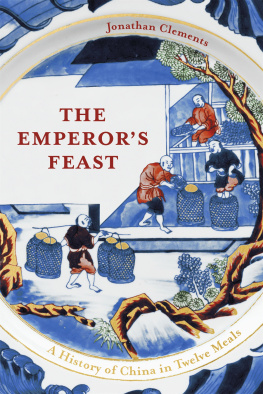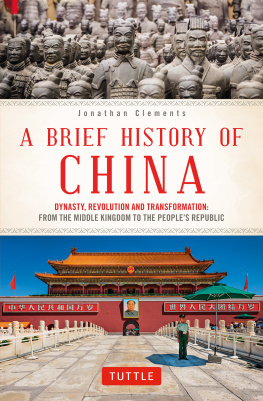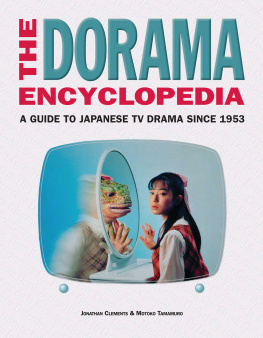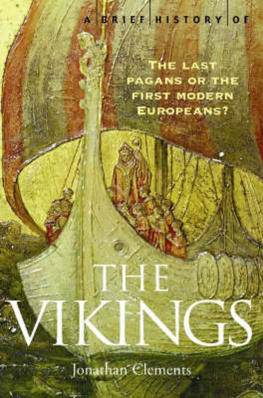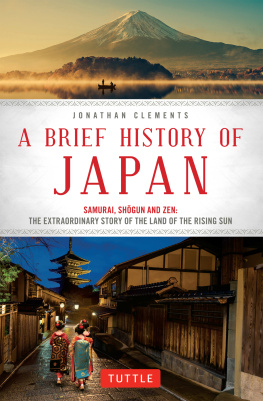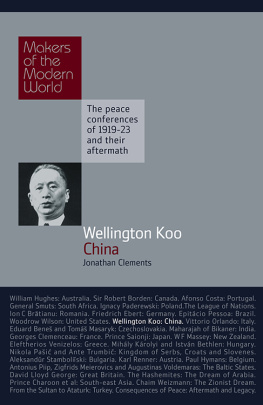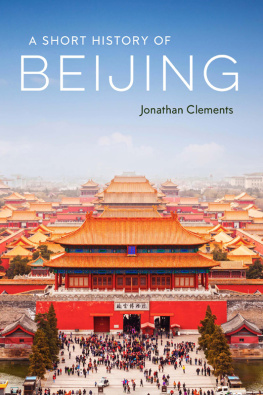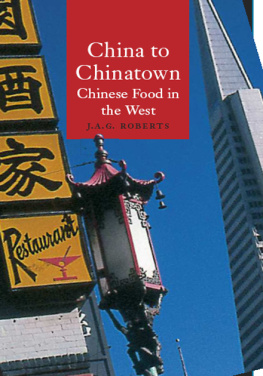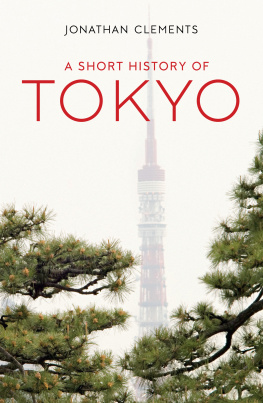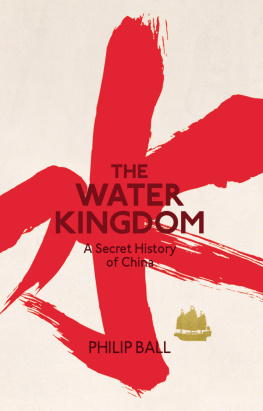Jonathan Clements - The Emperors Feast: A History of China in Twelve Meals
Here you can read online Jonathan Clements - The Emperors Feast: A History of China in Twelve Meals full text of the book (entire story) in english for free. Download pdf and epub, get meaning, cover and reviews about this ebook. year: 2021, publisher: Hodder & Stoughton Ltd, genre: Non-fiction. Description of the work, (preface) as well as reviews are available. Best literature library LitArk.com created for fans of good reading and offers a wide selection of genres:
Romance novel
Science fiction
Adventure
Detective
Science
History
Home and family
Prose
Art
Politics
Computer
Non-fiction
Religion
Business
Children
Humor
Choose a favorite category and find really read worthwhile books. Enjoy immersion in the world of imagination, feel the emotions of the characters or learn something new for yourself, make an fascinating discovery.
- Book:The Emperors Feast: A History of China in Twelve Meals
- Author:
- Publisher:Hodder & Stoughton Ltd
- Genre:
- Year:2021
- Rating:5 / 5
- Favourites:Add to favourites
- Your mark:
- 100
- 1
- 2
- 3
- 4
- 5
The Emperors Feast: A History of China in Twelve Meals: summary, description and annotation
We offer to read an annotation, description, summary or preface (depends on what the author of the book "The Emperors Feast: A History of China in Twelve Meals" wrote himself). If you haven't found the necessary information about the book — write in the comments, we will try to find it.
The Emperors Feast: A History of China in Twelve Meals — read online for free the complete book (whole text) full work
Below is the text of the book, divided by pages. System saving the place of the last page read, allows you to conveniently read the book "The Emperors Feast: A History of China in Twelve Meals" online for free, without having to search again every time where you left off. Put a bookmark, and you can go to the page where you finished reading at any time.
Font size:
Interval:
Bookmark:
Jonathan Clements is a historian and TV presenter specialising in East Asia. He is the author of several books on the history of China, including A Brief History of China , The Art of War: A New Translation , and Confucius: A Biography . His history of the Silk Road and his lives of the First Emperor, Empress Wu and Wellington Koo have all been translated into Chinese.
Jonathan has presented several seasons of Route Awakening (National Geographic), an award-winning television series about icons of Chinese culture. He was visiting professor at Xi'an Jiaotong University in China from 2013 to 2019.
Acknowledgements
Although I have spent much of my life cooking Chinese food at home, the second decade of the twenty-first century truly ramped up my experience of it, beginning with my six years as Visiting Professor at Xian Jiaotong University. There, Professors Li Qi and Wang Ye, and Dr Qiao Zhilin, welcomed me into an academic fraternity that did an awful lot of its business at banquets.
I was introduced to the idea of a faculty meal as a prolonged and boozy apology for having to work late, and a blow-out to impress the foreign dignitaries, not least by trying to make them feel like dignitaries. I got to see first-hand the politics of seating arrangements, and the nuances of who-paid-when, as well as the shadowy influence of ordering logistics, with entire banquet menus left in the hands of whichever two low-ranking postgrads had been sent ahead half an hour earlier.
Halfway through my time in Xian, my exposure to Chinese food received another boost when I was hired by May-yi Lee as a television presenter on the National Geographic Channels Route Awakening . Over the course of three seasons, fixers Clarissa Zhang and Mack Zhang and assistant producer Michelle Yap, along with inveterate foodie (and drone pilot) Michael Lee, arranged and steered uncountable meals, while the size of our crew allowed me to experience a wide variety of dishes all over China.
This is more important than it might seem; as noted by Ann Hui in Chop Suey Nation , solo researchers end up not seeing huge sections of the menu, because they cant eat it all. Director-producer Chang Sohkiak has been particularly pushy in my education on matters of Chinese food, a stern advocate for the originality of Teochew cuisine, and a vocal dissenter against the tendency to lump all southern Chinese foods into a catch-all Cantonese designation. She also took perverse pleasure in forcing me to eat things on camera, so I have her to thank for my experiences with pigeons dissolved in wine, fried grasshoppers, and a stew cooked in a cows digestive juices.
National Geographic also led to my whistle-stop tour of an entire province while making Shandong: Land of Confucius , in which I not only got to experience the dying art of L cuisine and to eat the best and freshest seafood of my life, but also the sight of our director, Jonathan Schtz, being handed a meal that was apparently rendered vegetarian by crossing out the word chicken on the box.
Emily Carlson was the one who first proposed the idea of a history of China told through its food, for which her punishment was to watch for a whole year while I struggled to put one together. She subsequently became my first reader; Andrew Deacon and Alicia Noel were next in line, before I delivered this book to my editor, Ian Wong at Hodder, who has gone far above and beyond the call of duty in hammering it into shape.
John Bains was my witness one fateful night in Taipei when I accidentally ate a dog. My former wife, Kati Clements, took some of the photographs in this book. My agent, Chelsey Fox of Fox & Howard, went on the warpath to find this book its best possible home. My father, Michael Clements, answered my questions about the Garden of China, which was a fading memory for both of us. Andrew Deacon accompanied me in a vegetarian feast at the Famen Temple, and numerous other dishes around Xian and Beijing, including that time when we ordered tripe, but didnt find out what it was until we got home and looked it up.
Feng Yangxi talked me through the peculiarities of the Chinese tea ceremony at her mothers tea shop. Gao Xisheng showed me around the Luoyang Museum. Miss Haifang took me through the Pagoda Brand wine factory. Ho Shulong pointed out the herbs in the Baisha garden established by his father, Ho Shixiu. Li Gung took me mushroom hunting in Lijiang. Louisa Lim answered my questions about the average customer journey at a branch of the Tasty Congee & Noodle Wantun Shop in Hong Kong (a story since redacted from this book). Liu Tianjie at the Gulong Soy Sauce Factory in Xiamen not only showed me around, but sent me away with a crate of condiments.
Julie Makinen was my companion on a hot date to Beijings Museum of Tap Water, which is a lot more interesting than it sounds. Alicia Noel took me out for vegetarian food at Tianchu Maoxiang. Wang Ju took me down into the granary pits of Huiluo. Yan Weixing put me to work chopping garlic in his Jinan restaurant while he sliced up a Sweet and Sour Carp. Zhang Xi let me hover in her Cambridge kitchen while she cooked a Teochew meal.
Stefan R. Landsbergers collection of Chinese propaganda pictures, now hosted at the International Institute of Social History in Amsterdam, is a treasure trove of images of Communist China, and I much appreciate the IISHs service archiving and offering high-resolution scans of propaganda images you can spend many happy hours there at chineseposters.net.
Harmonious Stew
From prehistory to bc Millet Gruels and stews Roast and dried meats Boiling and steaming The first alcohols and early chopsticks
Harmony may be compared to a stew. Water, fire, vinegar, meat pickles and plums are used to cook the fish fillets. It is heated by means of the firewood. The cook blends the ingredients and equalises them by taste, adding whatever is deficient and decreasing whatever is excessive.
The Zuo Commentary on the Spring and Autumn Annals
Shennong, the legendary Divine Farmer, was one of the great pioneers of Chinese food, who fashioned the first plough and taught early mankind how to rear animals for food. He was known as a god of burning, possibly because his people took the credit for introducing slash-and-burn cultivation, and ox-headed, perhaps in foggy memory of a cattle skull used as a ritual mask. He is essential to the story of Chinese food, because he was the figure who tried many of Chinas myriad foods for the first time, fearlessly sampling any new mushrooms, plants or meats.
The Grand Scribes Records , written in the first century bc , clearly describes Shennong as a clan rather than a man; even in earliest times it was understood that the name might not refer to an individual, but to a particular group that specialised in farming. To generations of Chinese people, Shennong was the author of a now-lost book that formed the basis of ancient farming techniques, and a pioneer in Chinese medicine. His name stands in place of thousands of unsung heroes (or unwilling victims) of Chinese cuisine, risking their lives to discover which berries were poisonous, and what would happen when you ate a particular mushroom. Shennong himself was a martyr to his cause when his experiments caught up with him. He was killed by a yellow herb that caused his intestines to rupture.
Food forms a major part of the discussions in the Book of Rites ( Li Ji ), an ancient manual of etiquette, protocols and customs that affords us a glimpse of life in China three thousand years ago. Attributed to the ancient sage Confucius, the Book of Rites proclaimed meals and mealtimes as the defining element that separated savagery from civilisation the raw from the cooked. The ancient kings, says the Book of Rites with head-shaking condescension, knew not yet the transforming power of fire, meaning that they had neither pottery nor cooked foods. They ate the fruits of plants and trees, and the flesh of birds and beasts, drinking their blood and swallowing the hair and feathers.
Next pageFont size:
Interval:
Bookmark:
Similar books «The Emperors Feast: A History of China in Twelve Meals»
Look at similar books to The Emperors Feast: A History of China in Twelve Meals. We have selected literature similar in name and meaning in the hope of providing readers with more options to find new, interesting, not yet read works.
Discussion, reviews of the book The Emperors Feast: A History of China in Twelve Meals and just readers' own opinions. Leave your comments, write what you think about the work, its meaning or the main characters. Specify what exactly you liked and what you didn't like, and why you think so.

